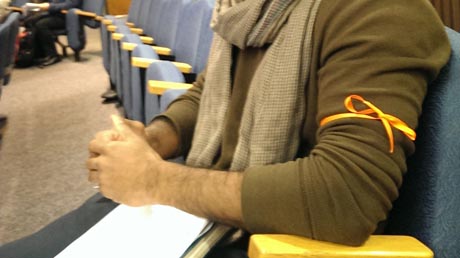Just when a debate over Santa Clara County’s civil detainer policy was getting stale, straight-laced Supervisor Joe Simitian delivered a bombshell by admitting he was arrested as a kid. The former state senator declined to share any more details except to say that he was locked up for “47-and-a-half hours” in Juvenile Hall on suspicion of some crime, cleared and then released. A details man, Simitian may be the only person to ever make the distinction between being in jail for 47-and-a-half hours and 48.
“I’m going to ask you about that later,” joked fellow Supervisor Cindy Chavez.
Maybe it was an attempt to relate, but Simitian’s youthful brush with the law hardly compares to the plight of undocumented immigrants who face deportation if charged with a crime.
Kicking the issue back to committee, the Board of Supervisors on Tuesday maintained the status quo—local authorities will continue to disregard requests from Immigration and Customs Enforcement (ICE) to hold undocumented inmates for further questioning about their immigration status.
Simitian’s motion to revise county rules to honor detainer requests for at least serious or violent offenders was shot down 3-2, with supervisors Dave Cortese, Ken Yeager and Chavez opposed.
“It’s fundamentally wrong to create a two-tier justice system,” said Yeager, who voted for the existing policy two years ago and called the old rules to honor detainer requests abusive.
That might be a moot point anyway, because county counsel says it found out just days ago that the feds have access to local law enforcement databases anyway, Chavez noted.
Dozens of residents argued that the county shouldn’t have to do ICE’s dirty work. Immigrants who fear deportation will often choose not to report a crime, said photographer and community activist Charisse Domingo, who grew up undocumented in an immigrant household.
“There were moments when that decision came up: Are you going to call the cops?” she told supervisors. “Do we risk deportation of yourself or a family member?”
Raj Jayadev, head of community group Silicon Valley De-Bug and early advocate of getting the current policy in place, said the county is a role model for pioneering one of the most progressive immigration detainer policies in the nation. Only a few jurisdictions, including Chicago’s Cook County, refuse to comply with civil detainer requests unless ICE reimburses them.
“I want to applaud this county for having the courage and leadership for not falling into the false choice … of public safety and immigrant rights, of public safety or equal protection for all,” Jayadev told supervisors.
Chavez cast the swing vote.
“I personally have been very conflicted about this,” she said.
Holding jailed immigrants for ICE, Chavez noted, would discourage the foreign-born community—that’s 40 percent of the county—from reporting crimes as victims and witnesses. Victims or witnesses to domestic violence might not want to report someone if they believe they could get deported. That could be the father of their child. The bigger problem is that dangerous criminals get released so quickly in the first place, Chavez said. The detainer policy is only part of a larger issue in the criminal justice system.
Another concern is that county law enforcement officials aren’t in agreement about what’s the best approach, Chavez said.
District Attorney Jeff Rosen and Sheriff Laurie Smith want to honor detainer requests for violent and serious offenders, warning that releasing illegal immigrants convicted or suspected of serious crimes may victimize other people. Public Defender Molly O’Neal and Director of Pretrial Services Garry Herceg want to maintain the current policy, to keep ICE agents out of the courtroom.

